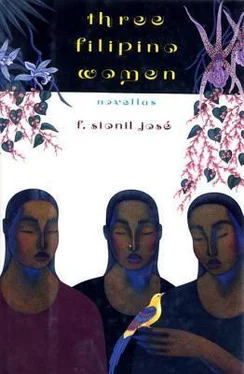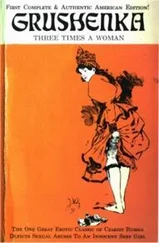Francisco Jose - Three Filipino Women
Здесь есть возможность читать онлайн «Francisco Jose - Three Filipino Women» весь текст электронной книги совершенно бесплатно (целиком полную версию без сокращений). В некоторых случаях можно слушать аудио, скачать через торрент в формате fb2 и присутствует краткое содержание. Год выпуска: 2013, ISBN: 2013, Издательство: Random House Publishing Group, Жанр: Современная проза, на английском языке. Описание произведения, (предисловие) а так же отзывы посетителей доступны на портале библиотеки ЛибКат.
- Название:Three Filipino Women
- Автор:
- Издательство:Random House Publishing Group
- Жанр:
- Год:2013
- ISBN:978-0-307-83028-9
- Рейтинг книги:4 / 5. Голосов: 1
-
Избранное:Добавить в избранное
- Отзывы:
-
Ваша оценка:
- 80
- 1
- 2
- 3
- 4
- 5
Three Filipino Women: краткое содержание, описание и аннотация
Предлагаем к чтению аннотацию, описание, краткое содержание или предисловие (зависит от того, что написал сам автор книги «Three Filipino Women»). Если вы не нашли необходимую информацию о книге — напишите в комментариях, мы постараемся отыскать её.
and
-examine the Philippine experience through the lives of three female characters, a prostitute, a student activist, and a politician.
Three Filipino Women — читать онлайн бесплатно полную книгу (весь текст) целиком
Ниже представлен текст книги, разбитый по страницам. Система сохранения места последней прочитанной страницы, позволяет с удобством читать онлайн бесплатно книгу «Three Filipino Women», без необходимости каждый раз заново искать на чём Вы остановились. Поставьте закладку, и сможете в любой момент перейти на страницу, на которой закончили чтение.
Интервал:
Закладка:
History will judge me not for what I am, however, and not even for what I have done but for what I have said. This is what goes on the record, this is what is dished out to the masses to read. And there will be scholars in the future as there are today who do not question the documents they read, who do not go beyond the archival presentation of the bureaucracy.
Between the lines, that is where history has always been.
There will always be those, however, who will say that history is written by the strong, but that is not enough: history has to be believed if it is to have currency, and believers are what I have always tried to make. There are enough dolts and jackasses among our elite who believe that they are so anointed to rule merely because they have their own propagandists churning out praises for them which, in time, they come to accept as the truth. I was never one of them — I always knew the limitations of power. But at the same time, I was also aware of the cupidity of those men who exercised power … Politics has always been accommodation, not uncompromising idealism, although that could help camouflage the real intentions of politicians. This is what I have always told Narita and this, I think, she believed.
What can I say about her? She was my daughter, she was my pupil, she was my heir. All my children — it is not that they have failed me. It was never in their blood — I see that now — to give the nation the service, the thinking that it needed, the way I devoted my life to it. But Narita — from the beginning, I knew that she would do justice to the name she had taken.
If I were only younger … but it does not matter. She was some woman, better looking than all the women I have had, and there have been a few … She learned very fast, she should have been the first woman president. She got as high as the Senate but even there, look at what she had done, the many programs on nutrition, on culture, on science she had started, the many Centers that were built at her inspiration. Food production has increased, thanks to her, and the sugar workers — although I should not be talking like this — are better off now because of her untiring and unselfish devotion to their cause. Don’t laugh — you know that my life had always revolved around sugar, its problems, its world market and, of course, that beautiful quota from the United States. But we were willing to be pushed a bit, not by those mealy mouthed priests, not by those radical labor leaders, but by those whom we trust, who know our feelings, who are part of our constellation. If we give justice to people, we should do so without being prodded and, by God, that is what we did.
These and so many more are Narita’s achievements and no gossip monger, no vitriolic critic can take these away.
I knew Narita as a child, I watched her grow; her ideas on nationalism, she got them from me. I was instrumental in shaping them, guiding them. Not that she did not have a mind of her own. In fact she was so independent at times, she could even afford afterwards to antagonize my friends and taunt the whole system itself.
So she has left me two wonderful boys who will not forget their mother as the most heroic, the most unusual Filipina in our history. Gabriela Silang, Tandang Sora, all those revered Filipinas in our lineage — they are really nothing compared to her. The scholars should have no difficulty in confirming this …
END OF TAPE
Looking back, I have often wondered about the exact moment when I began to delude myself. I know now that it was done slowly, bit by bit, with my own circumstances and needs, pushing me, my desire to justify myself, that I was really earning the money that she paid me. I also began to believe, towards the latter part of the relationship, that nothing much could be done about our political malaise until she had real power, when she could dictate and no longer have to deal with slimy politicians and make compromises. I realize that this is a fallacy, that government is not a vacuum, that where there are human relationships, compromises are inevitable and that, precisely speaking, the statesman is also a superb politician.
During the first year of her term, I worked hard and there were heated arguments within the think tank for the others were never told — and I never told them — that she was aiming for the Presidency. Of course, that did occur to them. The programs that we shaped always kept her in the public eye. She was a national figure now and well beyond the narrow partisan confines of bloc, of party. She had taken on, too, the nationalist mantle that the aging senator bestowed on her.
It was in the second year of her term that she went to this small college in our province to deliver a commencement address. It was a request she could not deny; besides, it afforded her a chance to see again the old hometown and, perhaps, renew ties. And as the newspapers related it, after she had finished her extemporaneous address on social justice as an ideal she wanted the young to promote, there was a standing and thunderous ovation. It was at this instance, too, that the young graduates all rushed to the stage to congratulate her. It was a mob scene and the stage suddenly swayed and then collapsed.
She had been knocked against a rusty iron truss, there was a gash on her arm — nothing serious, and she was moving around with a sling when she got to the provincial hospital her father-in-law had built.
It was the ultimate irony; a doctor decided to give her an anti-tetanus shot, just to be sure. In seconds, she was gasping in a massive anaphylactoid attack. There was no resuscitator, no anti-allergy shot available at that instance. In less than five minutes, she was dead.
These details were ignored by the papers. It was more dramatic to say it was the people’s enthusiasm which killed her, that she died in her home ground, defending the rights of the poor sacadas against the rich sugar oligarchs, the applause of the youth her lasting epitaph.
The mythmakers, particularly the PR staff of Senator Reyes, had more than a kernel to start with: The Narita Reyes Foundation immediately came into being purportedly to perpetuate the ideals for which Narita gave her life. Nowhere was it mentioned that the young people had rushed and crowded that flimsy stage for at the end of her speech Narita started handing out those envelopes that were, by then, a familiar gimmick in her public appearances and her campaign …
In a couple of years, there floated around variations of her last moments, perhaps to fit the temper of the times. Now, the CIA was responsible. She had been vocal in her anti-Americanism, in her espousal — like her father-in-law — of the removal of the American bases. The CIA saw to it that the stage would collapse!
I knew her well enough to see through her, that like Senator Reyes whose sugar interests survived on American largesse, Narita’s anti-Americanism was for the galleries, for the pseudointellectuals of the campuses.
The aides of Senator Reyes woke me up at three o’clock that morning and the senator and I flew to Bacolod in his Cessna, with the casket on board in the back. He was silent during the flight, his crumpled face grown darker with his grief. When we got to the hospital at daybreak, he thundered and raged and said he would have every doctor there forbidden to practice and jailed. We went to the room where Narita lay and at the sight of her, he broke down, the sobs torn out of him in gusts.
They brought the casket in and he forbade them to touch her; only the two of us could. I did not realize till then how light she was. Looking at the quiet face, the eyes closed as if in sleep, the cleft chin, it all came back — the little girl I had played with in Santa Ana, the splashing rain, the ripe guavas and the green cascade of cadena de amor in bloom. I did not want the Old Man to see me cry so I let the tears burn and fall without my wiping them.
Читать дальшеИнтервал:
Закладка:
Похожие книги на «Three Filipino Women»
Представляем Вашему вниманию похожие книги на «Three Filipino Women» списком для выбора. Мы отобрали схожую по названию и смыслу литературу в надежде предоставить читателям больше вариантов отыскать новые, интересные, ещё непрочитанные произведения.
Обсуждение, отзывы о книге «Three Filipino Women» и просто собственные мнения читателей. Оставьте ваши комментарии, напишите, что Вы думаете о произведении, его смысле или главных героях. Укажите что конкретно понравилось, а что нет, и почему Вы так считаете.












